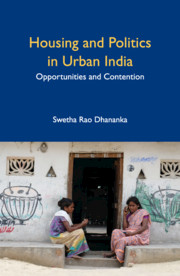Book contents
- Frontmatter
- Dedication
- Contents
- List of Figures
- List of Tables and Box
- Acknowledgements
- List of Abbreviations
- 1 Claiming Adequate Housing in Urban India: An Introduction
- 2 Indian Democracy: Normative Prescriptions and Everyday Practices
- 3 Governmentality of Housing and the Politics of Access
- 4 Mobilization on Behalf of the Urban Poor
- 5 Mobilizations by the Urban Poor
- 6 Claiming Housing despite Indian Politics and Governance
- Epilogue
- Bibliography
- Index
6 - Claiming Housing despite Indian Politics and Governance
Published online by Cambridge University Press: 30 April 2020
- Frontmatter
- Dedication
- Contents
- List of Figures
- List of Tables and Box
- Acknowledgements
- List of Abbreviations
- 1 Claiming Adequate Housing in Urban India: An Introduction
- 2 Indian Democracy: Normative Prescriptions and Everyday Practices
- 3 Governmentality of Housing and the Politics of Access
- 4 Mobilization on Behalf of the Urban Poor
- 5 Mobilizations by the Urban Poor
- 6 Claiming Housing despite Indian Politics and Governance
- Epilogue
- Bibliography
- Index
Summary
The overarching interest of this book was to investigate the ‘actual’ existing conditions for differently resourced civil society organizations to mobilize on the issue of adequate housing in the city of Bangalore in order to understand the impediments to social mobilization on the pressing issue of housing. I identified the concept of political opportunities stemming from social movement scholarship to be the pertinent conceptual tool to grasp this research question. The literature review on the concept revealed that there was a need to revisit it in view of post-colonial contexts. I put forward the argument that for the concept to be encompassing of a context like Bangalore (India), it needed to include informal dimensions and the fact that civil society was segmented (Chatterjee 2004). I argued that the development of a situated toolbox could serve the study of social movements in the Global South more widely, but also bring precision for Northern movements that are increasingly witnessing similar socio-political challenges as the South. In consequence, it was required to first look for differential openings of political opportunities in the democratic polity, policy, and law. I showed how everyday, informal practices of the investigated dimensions of political opportunities contrasted the formal prescriptions and argued for a provincialized understanding of democracy (Björkman 2014a). Second, I analysed the political opportunities offered by the housing policy under the Basic Services for the Urban Poor (BSUP) component of the Jawaharlal Nehru National Urban Renewal Mission (JNNURM) and argued for the requirement of a vernacular governance that takes into consideration cultural geographies. The general and the housing political opportunities were then related to the experience of the selected elite and political society organizations. In the case of the elite society organizations, I discerned how sourcing their discursive repertoire to justify their actions from the universal concept of citizenship made their interventions in the policy-affected communities independent of their intervention and that the interventions from political society organizations reflected their actions from the particular identity of caste. The organizational narratives revealed the differential political opportunities they faced and the different action and discursive repertoires that were developed in response.
- Type
- Chapter
- Information
- Housing and Politics in Urban IndiaOpportunities and Contention, pp. 154 - 183Publisher: Cambridge University PressPrint publication year: 2020



